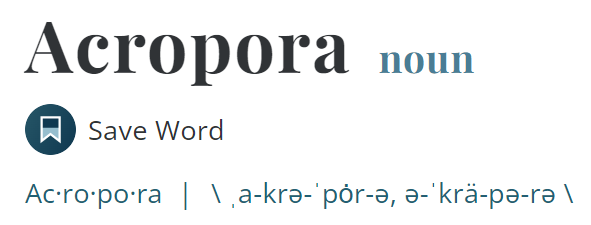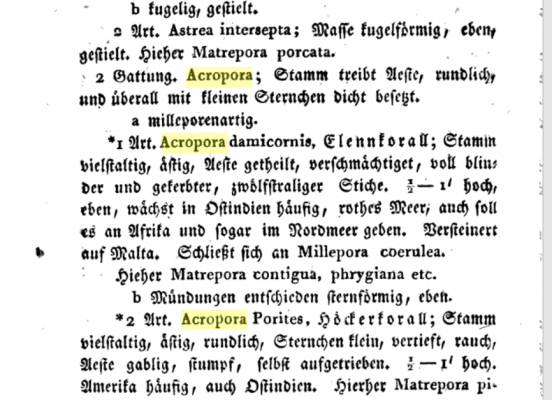Navigation
Install the app
How to install the app on iOS
Follow along with the video below to see how to install our site as a web app on your home screen.
Note: This feature may not be available in some browsers.
More options
You are using an out of date browser. It may not display this or other websites correctly.
You should upgrade or use an alternative browser.
You should upgrade or use an alternative browser.
Cynarina lacrymalis spawning project & setup.
- Thread starter Mr_Knightley
- Start date
- Tagged users None
I hate to be pedantic back, but I'm honestly curious if you can provide a reference for this etymology.
Acro-pora have tall pores as a distinguishing feature of the genus and Anacropora (Greek prefix an = without) lack the tall coralites that acropora have.
And what about all the other -pora species. The fact that -pora is shared suggests that it's the root word. It's not only the "-ora" as would be the case if the root were "crop."
I've spent some time looking for documentation that supports your claim and I just haven't found anything. Happy enough to be wrong, but not willing to concede on hearsay.

Me waiting to watch (and learn from) the taxonomy debate
- Joined
- Dec 20, 2019
- Messages
- 67
- Reaction score
- 129
Ora means "mouth," as in oral.I hate to be pedantic back, but I'm honestly curious if you can provide a reference for this etymology.
Acro-pora have tall pores as a distinguishing feature of the genus and Anacropora (Greek prefix an = without) lack the tall coralites that acropora have.
And what about all the other -pora species. The fact that -pora is shared suggests that it's the root word. It's not only the "-ora" as would be the case if the root were "crop."
I've spent some time looking for documentation that supports your claim and I just haven't found anything. Happy enough to be wrong, but not willing to concede on hearsay.
First things first, when you start mixing greek and Latin roots, which happens all the time, things get messy.
Next, corals have a lot of similarities along with differences. It's not unusual at all in taxonomy for a name to be assigned before more details are known about similar related organisms, and that leads to the earlier names being a lot less specific than the ones to follow.
Without a crop mouth, which is aCROPora, refers to the polyp arrangement the name describes. It's not the only coral with this feature, though, so later names to follow had to be given to differentiate very similar genera. Anacropora was created to differentiate two similar groups, of course, based on information learned after Acropora was named.
Yes, ora means mouth, and when it follows crop, it's natural to assume that it reads as pora, which sounds like pore, which sounds like it means mouth, so it's easy to see where confusion is generated.
Next, and this is the fun one, people make mistakes.
In the world of botany, names have to go before an international review board which assesses their legitimacy and accuracy. In the realm of cutting edge zoology, though, it's all too common for a name to be nothing more than whatever someone first published, often leading to many future revisions, and sometimes those first names are given in error. Think of the people who are the ones typically bestowing those names, after all; college kids working on their Master's degrees. They usually get it right, but sometimes they don't.
The cardinal rule they all should be following, though, is the simple fact that the emphasis is NOT put on the last or next to last syllable in words exceeding two syllables, but in the second one from the end. No matter what a's or an's or whatever else they want to toss in, this rule is almost absolute. The problems start when people try mixing greek and latin, like in your example, or when they violate the rule. To make matters worse, the rules can shift a bit when the focus is on Families and Orders instead if Genera and Species.
Even a name that was picked for something very specific, as in your example, is to be pronounced the proper way even if the meaning doesn't fit that flow.
I'm sorry about that. It's annoying, but that's how it goes. There are books on this very subject available. Dr. Peter Anthony Lewis authored one which is very good, and he was once renowned as THE expert on the subject.
To be fair, he himself once said that we may never know exactly how accurate we are in our assessment of the rules of Latin since its a dead language and nobody speaks it anymore. However, that's the very reason we use it, isn't it? We don't want to see any drift, any malleability, any changes over time, because that would eventually lead to latin becoming useless for our purpose. For that reason, the set of standards that we use have been set as THE standards.
I would guess that a quick search on eBay might turn up some books on latin roots and their meanings. That's how I found a couple. There's probably a book or two on the rules of taxonomy or latin use in taxonomy.
Again, search for Peter Anthony Lewis to find a good one mostly focused on fish and such.
That's about all I have to say about it. This is starting to look like the beginnings of a flame war, and I won't get sucked into one of those.
Last edited:
Ora means "mouth," as in oral.
First things first, when you start mixing greek and Latin roots, which happens all the time, things get messy.
Next, corals have a lot of similarities along with differences. It's not unusual at all in taxonomy for a name to be assigned before more details are known about similar related organisms, and that leads to the earlier names being a lot less specific than the ones to follow.
Without a crop mouth, which is aCROPora, refers to the polyp arrangement the name describes. It's not the only coral with this feature, though, so later names to follow had to be given to differentiate very similar genera.
Yes, ora means mouth, and when it follows crop, it's natural to assume that it reads as pora, which sounds like pore, which sounds like it means mouth, so it's easy to see where confusion is generated.
Next, and this is the fun one, people make mistakes.
In the world of botany, names have to go before an international review board which assesses their legitimacy and accuracy. In the realm of cutting edge zoology, though, it's all too common for a name to be nothing more than whatever someone first published, often leading to many future revisions, and sometimes those first names are given in error. Think of the people who are the ones typically bestowing those names, after all; college kids working on their Master's degrees. They usually get it right, but sometimes they don't.
The cardinal rule they all should be following, though, is the simple fact that the emphasis is NOT put on the last or next to last syllable in words exceeding two syllables, but in the second one from the end. No matter what a's or an's or whatever else they want to toss in, this rule is almost absolute. The problems start when people try mixing greek and latin, like in your example, or when they violate the rule. To make matters worse, the rules can shift a bit when the focus is on Families and Orders instead if Genera and Species.
Even a name that was picked for something very specific, as in your example, is to be pronounced the proper way even if the meaning doesn't fit that flow.
I'm sorry about that. It's annoying, but that's how it goes. There are books on this very subject available. Dr. Peter Anthony Lewis authored one which is very good, and he was once renowned as THE expert on the subject.
To be fair, he himself once said that we may never know exactly how accurate we are in our assessment of the rules of Latin since its a dead language and nobody speaks it anymore. However, that's the very reason we use it, isn't it? We don't want to see any drift, any malleability, any changes over time, because that would eventually lead to latin becoming useless for our purpose. For that reason, the set of standards that we use have been set as THE standards.
I would guess that a quick search on eBay might turn up some books on latin roots and their meanings. That's how I found a couple. There's probably a book or two on the rules of taxonomy or latin use in taxonomy.
Again, search for Peter Anthony Lewis to find a good one mostly focused on fish and such.
That's about all I have to say about it. This is starting to look like the beginnings of a flame war, and I won't get sucked into one of those.

Ora means "mouth," as in oral.
First things first, when you start mixing greek and Latin roots, which happens all the time, things get messy.
Next, corals have a lot of similarities along with differences. It's not unusual at all in taxonomy for a name to be assigned before more details are known about similar related organisms, and that leads to the earlier names being a lot less specific than the ones to follow.
Without a crop mouth, which is aCROPora, refers to the polyp arrangement the name describes. It's not the only coral with this feature, though, so later names to follow had to be given to differentiate very similar genera. Anacropora was created to differentiate two similar groups, of course, based on information learned after Acropora was named.
Yes, ora means mouth, and when it follows crop, it's natural to assume that it reads as pora, which sounds like pore, which sounds like it means mouth, so it's easy to see where confusion is generated.
Next, and this is the fun one, people make mistakes.
In the world of botany, names have to go before an international review board which assesses their legitimacy and accuracy. In the realm of cutting edge zoology, though, it's all too common for a name to be nothing more than whatever someone first published, often leading to many future revisions, and sometimes those first names are given in error. Think of the people who are the ones typically bestowing those names, after all; college kids working on their Master's degrees. They usually get it right, but sometimes they don't.
The cardinal rule they all should be following, though, is the simple fact that the emphasis is NOT put on the last or next to last syllable in words exceeding two syllables, but in the second one from the end. No matter what a's or an's or whatever else they want to toss in, this rule is almost absolute. The problems start when people try mixing greek and latin, like in your example, or when they violate the rule. To make matters worse, the rules can shift a bit when the focus is on Families and Orders instead if Genera and Species.
Even a name that was picked for something very specific, as in your example, is to be pronounced the proper way even if the meaning doesn't fit that flow.
I'm sorry about that. It's annoying, but that's how it goes. There are books on this very subject available. Dr. Peter Anthony Lewis authored one which is very good, and he was once renowned as THE expert on the subject.
To be fair, he himself once said that we may never know exactly how accurate we are in our assessment of the rules of Latin since its a dead language and nobody speaks it anymore. However, that's the very reason we use it, isn't it? We don't want to see any drift, any malleability, any changes over time, because that would eventually lead to latin becoming useless for our purpose. For that reason, the set of standards that we use have been set as THE standards.
I would guess that a quick search on eBay might turn up some books on latin roots and their meanings. That's how I found a couple. There's probably a book or two on the rules of taxonomy or latin use in taxonomy.
Again, search for Peter Anthony Lewis to find a good one mostly focused on fish and such.
That's about all I have to say about it. This is starting to look like the beginnings of a flame war, and I won't get sucked into one of those.
Nobody is having a flame war. You made a post that YOU called pedantic. I said I was fine with that if you could back it up.
My question was about roots and meanings, not about pronunciation.
You doing ok bud?
Edit: still hoping you can provide a citation to the original description of the genus that provides clear evidence for your point.
Last edited:
Though it matters very little, the Merriam Webster dictionary cites it as being pronounced such:

I've look all over and can't find the original type description for Acropora, if I can find what the type species is it'll make the search a lot easier. Also, the word Acropore is an adjective for any coral in the genus Acropora, so that may say something about the issue. Obviously, it doesn't matter in the long run if this can't remain civil, but it is an interesting discussion. What I've posted is nowhere near definitive, just another piece of the puzzle.

I've look all over and can't find the original type description for Acropora, if I can find what the type species is it'll make the search a lot easier. Also, the word Acropore is an adjective for any coral in the genus Acropora, so that may say something about the issue. Obviously, it doesn't matter in the long run if this can't remain civil, but it is an interesting discussion. What I've posted is nowhere near definitive, just another piece of the puzzle.
He may very well be right re. all of it, I'd just like to see evidence other than "some guy on the internet who doesn't like people to disagree with him said so."Though it matters very little, the Merriam Webster dictionary cites it as being pronounced such:

I've look all over and can't find the original type description for Acropora, if I can find what the type species is it'll make the search a lot easier. Also, the word Acropore is an adjective for any coral in the genus Acropora, so that may say something about the issue. Obviously, it doesn't matter in the long run if this can't remain civil, but it is an interesting discussion. What I've posted is nowhere near definitive, just another piece of the puzzle.
Though it matters very little, the Merriam Webster dictionary cites it as being pronounced such:

I've look all over and can't find the original type description for Acropora, if I can find what the type species is it'll make the search a lot easier. Also, the word Acropore is an adjective for any coral in the genus Acropora, so that may say something about the issue. Obviously, it doesn't matter in the long run if this can't remain civil, but it is an interesting discussion. What I've posted is nowhere near definitive, just another piece of the puzzle.
Don’t forget that MW includes etymology for the word as well. It just doesn’t provide much more than that.
Not to undermine my own argument, but I honestly I wouldn't be surprised if Webster got this wrong. It's not what I'd call a scientific reference. That being said, MW does reference the root being -pore...Don’t forget that MW includes etymology for the word as well. It just doesn’t provide much more than that.
Hmm... This is gonna take a while.
"stems husk, roundish, and densely fastened everywhere with small stars"
I'll have to do the rest later.
"stems husk, roundish, and densely fastened everywhere with small stars"
I'll have to do the rest later.
- Joined
- Jan 15, 2020
- Messages
- 1,520
- Reaction score
- 1,511
Yeah in all old german scientific papers and dictionaries they are listed under the umbrella of "Porenkoralle", pore-coral.
As for the rest of the translation
a) like Millepora
1st Species: Acropora damicornis, [elennkorall, moose-corals]; Stem taking many forms, branching, branches divided, getting thinner towards the end, full of dull and colored, 12-rayed [Stiche, not sure on what that is supposed to mean, possibly polyps, possibly polyps]
1/2 to 1 [unit of length] tall, flat top, grows commonly in East India, the red sea, also allegedly exists in Africa and even the Norwegian Sea. Fossils on Malta. Affiliated with Millepora coerulea
Move Matrepora contigua, phrygiana etc here
b) Mouths firmly star-shaped, flat
2nd Species: Acropora Porites, hump-corals; Stem taking many forms, branching, roundish, stars are small, recessed, [rauch, smoke? no idea what that's supposed to mean], branches forked, blunt, [selbst ausgetrieben, something to do with branching or budding]. 1/2 to 1 [unit of measurement] tall. Common in America, also East India.
Move Matrepora something-something here
"""
As for the rest of the translation
a) like Millepora
1st Species: Acropora damicornis, [elennkorall, moose-corals]; Stem taking many forms, branching, branches divided, getting thinner towards the end, full of dull and colored, 12-rayed [Stiche, not sure on what that is supposed to mean, possibly polyps, possibly polyps]
1/2 to 1 [unit of length] tall, flat top, grows commonly in East India, the red sea, also allegedly exists in Africa and even the Norwegian Sea. Fossils on Malta. Affiliated with Millepora coerulea
Move Matrepora contigua, phrygiana etc here
b) Mouths firmly star-shaped, flat
2nd Species: Acropora Porites, hump-corals; Stem taking many forms, branching, roundish, stars are small, recessed, [rauch, smoke? no idea what that's supposed to mean], branches forked, blunt, [selbst ausgetrieben, something to do with branching or budding]. 1/2 to 1 [unit of measurement] tall. Common in America, also East India.
Move Matrepora something-something here
"""
Last edited:
Cool. Sounds like a compelling case for -pore being the root.Yeah in all old german scientific papers and dictionaries they are listed under the umbrella of "Porenkoralle", pore-coral.
As for the rest of the translation
a) like Millepora
1st Species: Acropora damicornis, [elennkorall, moose-corals]; Stem taking many forms, branching, branches divided, getting thinner towards the end, full of dull and colored, 12-rayed [Stiche, not sure on what that is supposed to mean, possibly polyps, possibly polyps]
1/2 to 1 [unit of length] tall, flat top, grows commonly in East India, the red sea, also allegedly exists in Africa and even the Norwegian Sea. Fossils on Malta. Affiliated with Millepora coerulea
Move Matrepora contigua, phrygiana etc here
b) Mouths firmly star-shaped, flat
2nd Species: Acropora Porites, hump-corals; Stem taking many forms, branching, roundish, stars are small, recessed, [rauch, smoke? no idea what that's supposed to mean], branches forked, blunt, [selbst ausgetrieben, something to do with branching or budding]. 1/2 to 1 [unit of measurement] tall. Common in America, also East India.
Move Matrepora something-something here
"""
Still, I'm open to seeing support for the "crop" argument. Hopefully someone will post something.
OP-- sorry for interrupting your cool coral spawning thread.
No problem! I may start another thread to discuss this topic, since it's so interesting, but I've got nothing to report on with the project right now so I don't mind.Cool. Sounds like a compelling case for -pore being the root.
Still, I'm open to seeing support for the "crop" argument. Hopefully someone will post something.
OP-- sorry for interrupting your cool coral spawning thread.
For those curious, this is the document I'm talking about.
Page 66 is of interest to us, but there's a lot more than just that in the book!

Page 66 is of interest to us, but there's a lot more than just that in the book!
Okens Lehrbuch der Naturgeschichte
books.google.com
what the heck.... I came here for pretty Cynarina's.... TY @Mr_Knightley very impressed with your selection.
And, there's a debate on how to say "acropora". You guys cannot be this bored with your reefs.
I'll keep to watching for them spawning updates!
And, there's a debate on how to say "acropora". You guys cannot be this bored with your reefs.
I'll keep to watching for them spawning updates!
Lol the lights had turned off!what the heck.... I came here for pretty Cynarina's.... TY @Mr_Knightley very impressed with your selection.
And, there's a debate on how to say "acropora". You guys cannot be this bored with your reefs.
I'll keep to watching for them spawning updates!
I completely understand!Lol the lights had turned off!
This thread has me debating if I should get one of these cynarinas, acanthophyllias or an indophyllia. Surely, not for spawning reasons. They are gorgeous.
All 3.I completely understand!
This thread has me debating if I should get one of these cynarinas, acanthophyllias or an indophyllia. Surely, not for spawning reasons. They are gorgeous.
I have cynarina & acanthophyllia - still looking for indophyllia to add.
Similar threads
- Replies
- 1
- Views
- 149
- Price: 225-330
- Shipping Available
- Replies
- 1
- Views
- 268
- Replies
- 8
- Views
- 302



















